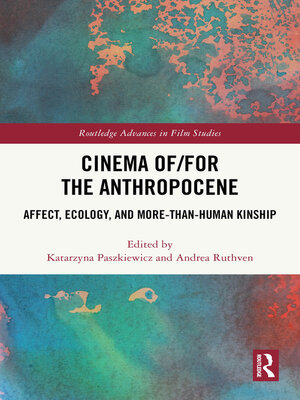Cinema of/for the Anthropocene
ebook ∣ Affect, Ecology, and More-Than-Human Kinship · Routledge Advances in Film Studies
By Katarzyna Paszkiewicz

Sign up to save your library
With an OverDrive account, you can save your favorite libraries for at-a-glance information about availability. Find out more about OverDrive accounts.
Find this title in Libby, the library reading app by OverDrive.



Search for a digital library with this title
Title found at these libraries:
| Library Name | Distance |
|---|---|
| Loading... |
Cinema of/for the Anthropocene sheds new light on the question of how films can allow us to resituate ourselves within what is known today as the Anthropocene. The authors address this question through a variety of disciplines and theoretical perspectives, from film and cultural studies, new materialisms, critical posthumanism and animal studies, critical race theory and Indigenous media studies, to gender and sexuality studies, with a primary focus on films produced in the United States and Canada.
The volume moves beyond the mere acknowledgment of the devastating damage inflicted during the Anthropocene to think about new ways of inhabiting the world through concepts such as affect, response-ability, and more-than-human kinship. The writers in this collection respond to its invitation by addressing a range of genres and modes, thus complicating the apocalyptic discourses which have typically been central to the studies on the Anthropocene: in addition to dystopian films, the volume discusses animated films, Hollywood biopics, climate change documentaries, experimental film, comedy, horror sci-fi, as well as disease thriller and survival film. Taken together, the chapters offer cross-disciplinary readings of the cinema of/for the Anthropocene, showing ways in which it can help us re-orient our thinking to make sense of the current age and address the planetary-scale environmental catastrophe.
This volume will appeal to researchers and students in film studies, cultural studies, and the burgeoning field of environmental humanities.







